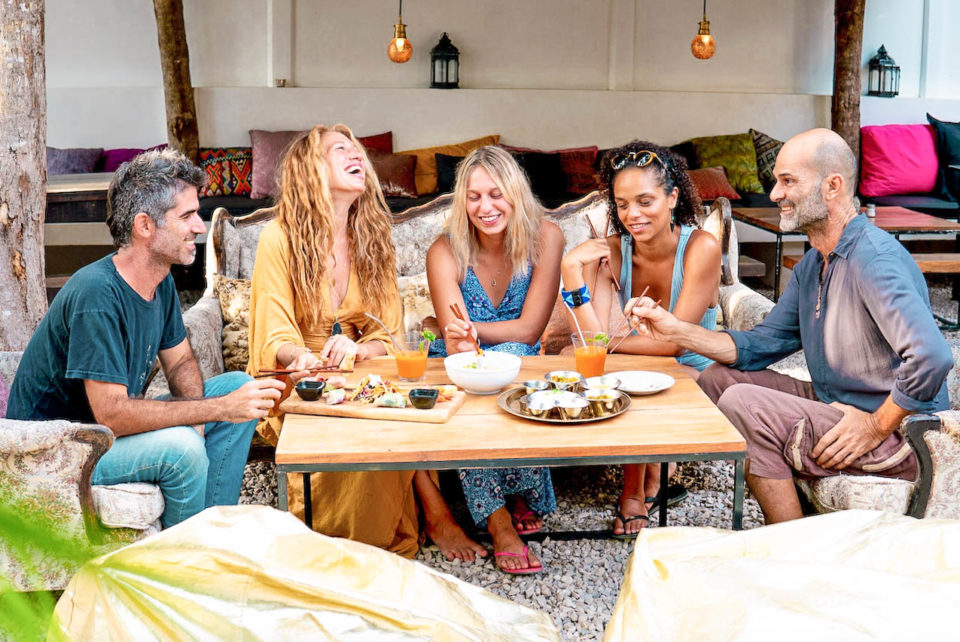Mindful Mealtimes
Develop stronger connections with your family by infusing your mealtimes with offerings of gratitude.
During my time in Nosara, Costa Rica, I noticed that the locals lived longer, brighter, happier lives. What’s their secret? Fulfilling lifestyles are built upon the foundations of community-centric rituals, mindful mealtimes, and meaningful family bonding.
Located on Costa Rica’s Nicoya Peninsula, Nosara is a rare region of the world known as a “blue zone.” According to National Geographic, blue zones are home to some of the oldest and healthiest people on the planet. An essential characteristic of blue zone living is interconnection among family and community members. Residents visit their families weekly or even daily, prepare meals together, and enjoy the outdoors with prayer.
Families don’t stay connected through Facebook and Instagram as they do in the States. Instead, both locals and expats invest in thriving, intimate connections with their respective families. Here are the practices that they have shared with me– practices that anyone can use to strengthen bonds, maintain healthy communication, and create a bigger world impact.

Gratitude
Gratitude unlocks the richness of life, as communicating gratefulness creates a shared experience of joy. Thankfulness illuminates all of the incredible, tiny elements weaved together in the unique tapestries of our human experience. As a practitioner of Kundalini Yoga, as well as ancient Taoist and Zen Buddhist wisdom, I’ve begun to infuse my mealtimes with ancient rituals from these traditions.
Set aside a small plate of food to honor your ancestors and hold hands as a family while you bless the food. Before taking your first bite, chant a prayer or phrase that resonates with you, such as “Sat Nam.” Sat Nam is a blessing offered in the Kundalini Yoga tradition that literally translates to “truth is my identity.” It serves as a universal reminder to live with integrity and gratitude.
During the meal, you may discuss the elements and ingredients that brought your meal to the table: cooks, farmers, transporters, and everyone in between. This food is the culmination of countless labors, of every gentle hand that has touched the seed that is now in the beautiful meal in front of you. Your nourishment is an act of communion with vast numbers of people in the past, present and future. Offer them your gratitude.
Dialogue
You may also open the conversation to discuss how you are supporting other people. Ask each other: What are we doing for others? Are we pulling our weight? Is this food being put to good use? As a family, how can we give back what we aren’t consuming to those who need it, and to the environment? Are we composting food waste? In Buddhist tradition, the essential practice of mindfulness helps us to transcend three poisons that cultivate evil: greed, anger and delusion. With our food, we must take particular care to not be greedy.
Hopefully, these conversations may inspire your family to take on new projects and give back to your community together.
A Meal Chant From the Nichiren School
The sun, moon, and stars that nourish our bodies, as well as the five grains of the earth that nurture our spirits, are all gifts of the Eternal Buddha. Each drop of water and each grain of rice are the fruits of meritorious work and hard labor. May this meal help us maintain health in our bodies and minds, uphold the teachings of the Buddha, repay the Four Favors, and perform the pure conduct of serving others.
Nam Myoho Renge Kyo. Itadakimasu.
To “repay the Four Favors” in the Nichiren school is to repay the debt we owe to our parents, all sentient beings, our national rulers, and the Three Treasures (the Buddha, the Dharma, and the Sangha). The foundation of Nichiren practice is Nam Myoho Renge Kyo, which translates to “devotion to the Mystic Law of the Lotus Sutra.” Express gratitude to everyone who prepared the meal with the phrase Itadakimasu, meaning “I receive.” In Japan, the phrase also means something close to “let’s eat!”
From a Buddhist perspective, eating is an interaction with the entire phenomenal universe. Mealtimes are gifts given to us through the work of all beings. We vow to be worthy of these gifts and work to benefit others. You should always receive and eat your food with gratitude and reverence.
When we infuse our mealtimes with these offerings of gratitude, we can create conversations about the journeys of our food and the blessings of abundance and love in our lives. More importantly, we realize how we can become more generous and kind to both each other and our world.
Photo Credit: @anna__katarina

Fern Olivia is the founder of Thyroid Yoga® and Ajai Alchemy.
Combining her education in Biomedical Engineering with her studies in yoga and integrative nutrition, Fern Olivia has created Thyroid Yoga®, a unique approach to supporting thyroid health.
In addition to teaching, retreats, events, and speaking on the topics of holistic health and self-expression, her course is a best-seller on MindBodyGreen and she trains wellness leaders and practitioners in her Thyroid Yoga® training, now available internationally. Fern Olivia is also the founder of Ajai Alchemy, an all organic essential oil fragrance brand specifically formulated with synergistic hormone balancing and aphrodisiac benefits.
Through her authentic storytelling, media platforms, and new TV show, Sensual Intelligence, Fern Olivia has inspired a mass movement of conscious self-expression and holistic health.







